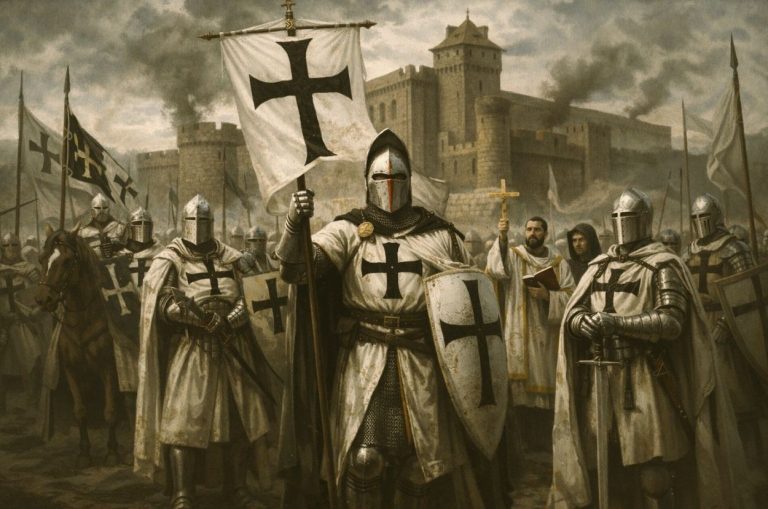

The United States is becoming a religiously diverse nation where Christianity no longer holds the numerical dominance it once did.

By Matthew A. McIntosh
Public Historian
Brewminate
Introduction: A Religious Landscape in Rapid Transition
Christianity is no longer the dominant cultural force it once was in the United States, and every major dataset shows the shift accelerating. NPR reports that the Christian share of the population has been shrinking for decades, with projections showing it could fall below 50 percent by 2070. Fewer Americans identify as Christian each year, while atheism, agnosticism, and alternative spiritual identities continue to rise. Younger generations are turning away from organized religion in large numbers, reshaping the country’s religious landscape in ways that were unthinkable a generation ago.
This demographic transformation has profound political consequences, particularly among groups that have long relied on Christianity’s majority status to exert cultural and legislative influence. As the Christian share of the population declines, Christian nationalist movements have become more aggressive in their attempts to entrench religious authority in government. The ACLU warns that the initiative seeks to embed conservative Christian doctrine into federal policy, reshape civil rights protections, and dismantle the separation of church and state.
Faced with the reality of shrinking numbers and diminished cultural dominance, Christian nationalist factions increasingly turn to political strongmen to preserve their influence. Trump, whose strongest base remains white evangelical Christians, has become a symbolic vehicle for these efforts, even as the broader American public moves toward greater religious diversity. The divide is stark: while the nation trends toward pluralism, the Christian nationalist response grows more desperate, a reaction fueled not by confidence in the future, but by fear of losing control.
The Decline of Christianity: Data From Multiple National Surveys
National surveys from multiple research institutions show a clear, consistent pattern: Christianity’s share of the U.S. population is shrinking across every major demographic group. The Christian majority has been declining for decades, with projections showing that Christians could fall below 50 percent of the population by 2070 if current trends continue. This trajectory reflects a long-term shift rather than temporary fluctuation, accelerated by generational change and growing disaffiliation among younger Americans.
Recent releases from Pew Research confirm this movement. In its 2025 “If the U.S. Had 100 People” breakdown, Pew shows that Christians now represent a smaller portion of the population than in previous decades, while nonreligious identities occupy a growing share. The findings illustrate a more pluralistic landscape in which no single religion dominates, indicating a national transition toward broader diversity in belief and affiliation.
Global data mirrors this trend. Religiosity has dropped across much of the world, and the United States is part of this broader movement away from organized religion. The poll shows that fewer Americans report religion as important in their daily lives and that self-identification with religious institutions has fallen steadily. These shifts are not limited to any one region or age group but are occurring nationwide.
Cultural analysis adds context to these numbers, highlighting the factors driving Christianity’s decline: distrust in religious institutions, political polarization, generational differences in belief, and the rise of individualized spiritual practices. As these forces converge, the traditional dominance of Christianity in American life continues to weaken, reshaping both religious culture and political alignments.
Rise of the Religiously Unaffiliated and Shifting Spiritual Identities
As Christianity declines, the fastest-growing category in American religious life is the religiously unaffiliated,a group that includes atheists, agnostics, and people who describe themselves as “nothing in particular.” This group has expanded steadily for decades and now makes up a significant share of the population, particularly among younger adults. The outlet notes that this growth parallels a drop in church participation and a general shift away from traditional religious institutions.
Data shows that nonreligious identities account for a substantial and growing block of Americans. Many in this category don’t reject spirituality outright but instead seek meaning through individualized practices that fall outside organized religion. This shift contributes directly to Christianity’s shrinking share, as fewer people raised in the faith continue identifying with it in adulthood.
Reporting highlights the reasons behind this movement: frustration with politicized religion, disillusionment with institutional scandals, and generational comfort with secularism and nontraditional forms of belief. Many younger people prefer flexible or personal approaches to spirituality over affiliation with a single religious tradition. These trends reinforce the momentum away from Christianity and toward a landscape defined by pluralism, fluid identity, and declining institutional authority.
Christian Nationalism Reacts to Declining Majorities
The accelerating decline of Christianity has triggered growing anxiety within Christian nationalist movements, which have long relied on their status as cultural and demographic majorities. Conservative Christian leaders increasingly express fear about “losing influence” as younger generations detach from institutional religion. This fear is not abstract; it is tied directly to the numbers showing rapid erosion of Christian identification across the country. As Christianity’s dominance shrinks, these leaders view their political power as slipping with it.
This demographic shift is documented clearly in the national surveys. The share of Christians is falling across every age group, while nonreligious identities are now one of the most significant forces reshaping American belief. For Christian nationalists, these trends present a fundamental challenge: a movement built around the idea of America as a “Christian nation” is confronted with the reality that fewer Americans identify as Christian at all. The more the country diversifies, the less persuasive their claim to cultural ownership becomes.
In response, Christian nationalist groups have intensified efforts to embed Christianity into political and civic institutions. Reporting highlights the rhetoric emerging from conservative Christian organizations that frame declining affiliation as a national crisis requiring government intervention. This rhetoric often blurs the line between religious advocacy and political control, casting pluralism itself as a threat to the country’s supposed identity. These narratives are increasingly visible in speeches, political platforms, and calls for religiously motivated policy.
This escalation mirrors historical patterns in which dominant groups respond defensively when their cultural authority erodes. As the surveys show Christianity’s majority slipping, Christian nationalist movements turn to political strategies aimed at preserving their influence regardless of demographic change. These strategies include pressing for expanded religious exemptions, resisting secular governance, and advocating for laws that reflect conservative Christian doctrine. The decline in religious affiliation is met not with adaptation but with an insistence on enforcing old hierarchies.
The result is a movement defined less by religious faith than by the desire to control civic life as Christianity’s influence wanes. This backlash is fueled by an awareness that the country is transitioning into a pluralistic era where no single religion holds dominance. Faced with this reality, Christian nationalist groups increasingly view the political arena as the last remaining place to secure the authority they are losing in culture, an approach that sets the stage for their policy ambitions.
Project 2025 and the Push for Theocratic Policy Influence
Project 2025 has become the clearest expression of how Christian nationalist groups hope to reclaim cultural authority through political power. The ACLU’s detailed analysis describes the initiative as a sweeping blueprint designed to reshape the federal government along conservative Christian ideological lines. The plan outlines major structural changes, from reorganizing federal agencies to limiting civil rights protections, with the explicit goal of embedding religiously motivated policy into the machinery of the state.
Project 2025 would drastically expand the role of religious doctrine in public policy by weakening or eliminating protections that safeguard the separation of church and state. The analysis notes that proposed changes include reducing access to reproductive health care, restricting LGBTQ+ rights, altering education standards, and redefining federal nondiscrimination rules to allow broad religious exemptions. These proposals collectively reflect a vision in which conservative Christian beliefs guide federal decision-making and override secular governance norms.
The plan’s architects frame Project 2025 as a path to “restore” the nation, but civil rights groups warn that it would concentrate authoritarian power in the executive branch while elevating one religious ideology above all others. The project’s scope is unprecedented in modern American politics, describing it as a direct threat to pluralism and democratic institutions. By reshaping federal authority around religious priorities, the initiative would impose changes that affect Americans regardless of their own beliefs or religious identities.
Project 2025 has gained traction precisely at a moment when Christianity’s demographic dominance is diminishing. For Christian nationalist groups, the initiative functions as a way to lock in political influence even as cultural influence erodes. These proposals are not abstract wish lists; they are operational plans awaiting political opportunity. As Christian affiliation continues to decline, the push to institutionalize religious authority through policy becomes more aggressive, and more dangerous for the diverse, pluralistic society reflected in every major survey.
Trump’s Role in Christian Nationalist Mobilization
Even as overall Christian affiliation declines, Trump continues to rely heavily on conservative Christian voters, particularly white evangelicals, who remain his most loyal and influential base. White evangelical Christians are the only major religious group whose political alignment has grown more firmly Republican over the past decade. Despite shrinking numbers nationwide, their turnout and political organization give them an outsized role in shaping Republican priorities, making their continued support central to Trump’s political strategy.
This allegiance is reinforced by demographic trends. As the broader U.S. population moves toward greater religious diversity and a growing share of nonreligious identities, white evangelicals stand out as the group most committed to Trump’s policy agenda and rhetoric. Pew’s breakdowns show that they remain significantly more supportive of Christian nationalist positions than other Christian groups, particularly on issues of church-state separation, education, and civil rights. This alignment makes them a natural constituency for efforts like Project 2025, which is deeply rooted in Christian nationalist ideology.
Many conservative Christian leaders now view Trump less as a symbol of religious virtue and more as a political instrument, someone who can preserve their influence in a country where Christianity is steadily losing its demographic dominance. Conservative churches and religious organizations increasingly frame Trump as a defender of their place in American public life, even as the next generation moves away from organized religion at accelerating rates. His role becomes less about belief and more about maintaining power during a period of rapid cultural transformation.
For Christian nationalist movements, Trump represents continuity in a moment of profound demographic change. Christianity’s decline is reshaping the country’s religious identity, but the loyalty of white evangelical voters gives Trump a stable foundation from which to advance policies aligned with their goals. As Christian affiliation shrinks, this political alliance becomes more strategic and more urgent for the movement, turning Trump into both a symbol of resistance to pluralism and a vehicle for imposing Christian nationalist priorities at the federal level.
Historical Patterns: Majorities Losing Power Often React With Force
As America becomes more religiously diverse, the political behavior of Christian nationalist groups increasingly reflects a familiar historical pattern: when long-dominant groups see their influence slipping, they often react with fear, urgency, and attempts to reclaim control through political force rather than persuasion. The demographic data shows Christianity steadily losing ground, especially among younger generations. For movements that have long depended on majority status to frame their worldview, this decline feels existential, not merely cultural, and that sense of loss shapes how they engage with politics.
The rhetoric emerging from Christian nationalist organizations reflects this defensive posture. Instead of adapting to a pluralistic future, these groups seek mechanisms to codify their authority even as their numbers diminish. Their insistence on placing conservative Christian doctrine at the center of public life is not driven by broad public demand but by the fear that a changing society will no longer defer to them. This is the same dynamic that often fuels aggressive political behavior when former majorities confront the reality of demographic decline.
As Christianity continues its gradual numerical decline, these reactions are becoming sharper and more urgent. Christian nationalist actors increasingly frame pluralism as a threat and portray religious diversity as a crisis requiring extraordinary measures. The political moves tied to this anxiety, from attacks on church-state separation to sweeping projects like the agenda outlined in Project 2025, are less about expanding religious freedom than about maintaining power in a society moving beyond their control. In this moment of transition, the danger is not the decline of Christianity itself but the backlash from those who refuse to accept it.
Conclusion: A Pluralistic Future and the Backlash Trying to Stop It
Every major dataset points toward the same trajectory: the United States is becoming a religiously diverse nation where Christianity no longer holds the numerical dominance it once did. Younger generations are moving away from formal religious institutions in large numbers, and the share of Americans who identify as atheist, agnostic, or simply unaffiliated continues to rise. These shifts represent a long-term cultural transformation that no political movement can reverse, no matter how aggressively it resists the change.
But it is precisely this shift that fuels the escalation of Christian nationalist politics. As the ACLU’s analysis of Project 2025 makes clear, the movement’s strategy is not to appeal to a changing public but to use federal power to entrench conservative Christian ideology in government. With Christianity’s share of the population shrinking, these groups see political authority as the last remaining way to assert control. Trump’s continued alignment with these factions amplifies the divide between a country moving toward pluralism and a political movement determined to impose religious dominance through policy.
The future, however, is trending toward greater diversity, not less. The demographic changes underscore that American public life is becoming more varied in belief, identity, and values. The question for democracy is not whether this change will continue (it will) but whether the nation can navigate the backlash from those who refuse to accept it. Preserving a pluralistic society will require rejecting the authoritarian ambitions of Christian nationalism and affirming that no single religious tradition can claim ownership over a country that now reflects many.
Originally published by Brewminate, 11.20.2025, under the terms of a Creative Commons Attribution-NonCommercial-NoDerivatives 4.0 International license.


